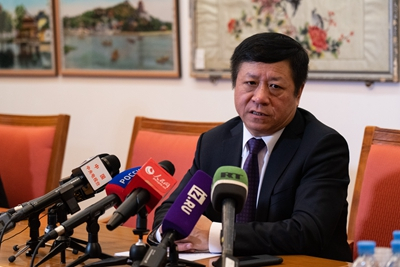Chinese and Russian experts are making progress in jointly developing drugs and vaccines for the COVID-19 as the outbreak continues to impact China and the world.
Chinese Ambassador to Russia Zhang Hanhui said Moscow sent a team of experts to China earlier this month and is working with their Chinese counterparts to develop drugs for the virus. The work is "making initial progress," he said.
As of February 24, Chinese health authorities have reported 77,658 infected cases, the majority of which were found in Hubei Province, the epicenter of the outbreak.
Elsewhere in the world, COVID-19 death toll climbed to seven in Italy, and several Middle Eastern countries are dealing with their first infections.
The World Health Organization (WHO) said the rapid acceleration of cases in Italy going from three on Friday to 220 on Monday is concerning. WHO Chief Tedros Adhanom Ghebreyesus said the world needs to focus on containment while preparing for a pandemic.
Read more:
Xi Jinping urges to orderly resume business operations
While acknowledging that the epidemic is the "largest public health emergency" since the founding of the People's Republic of China in 1949, Zhang said new cases outside Hubei have fallen for 21 consecutive days and three provinces reported zero new infections for 18 consecutive days.
The figures show the disease is curable and controllable, Zhang said.

Chinese Ambassador to Russia Zhang Hanhui briefs the media on COVID-19 prevention and control efforts in China, February 24, 2020. /Website of China's embassy to Russia
Chinese Ambassador to Russia Zhang Hanhui briefs the media on COVID-19 prevention and control efforts in China, February 24, 2020. /Website of China's embassy to Russia
Zhang highlighted some medicines in the treatment of infected patients. He said clinical trials showed some patients were responding positively to a drug named Abidol developed by Russian scientists, and some traditional Chinese medicine (TCM) remedies can effectively inhibit the infection.
Zhang also thanked Russia's assistance, saying President Vladimir Putin has sent a message of sympathy to President Xi Jinping and publicly expressed his firm support for China. He added that the Russian government has sent tons of medical supplies to China.
China expresses sincere gratitude to Russia's help and believes that the political trust and unity will further strengthen after the epidemic, the diplomat said.
Speaking of the stalled economic activities in China, Zhang said the negative effect is temporary as low-risk provinces are restoring their economic output in an orderly fashion. The most urgent work is to resume business and economic activities, Zhang said.
The resumption of work and businesses will not only increase the world's confidence in China, the world's second largest economy, but also inject new impetus into world economy.
(Cover: Ambulances are parked where a passenger was suspected of being infected with the new coronavirus after arriving from Kiev at a rail station in Moscow, Russia, February 21, 2020. /AP)